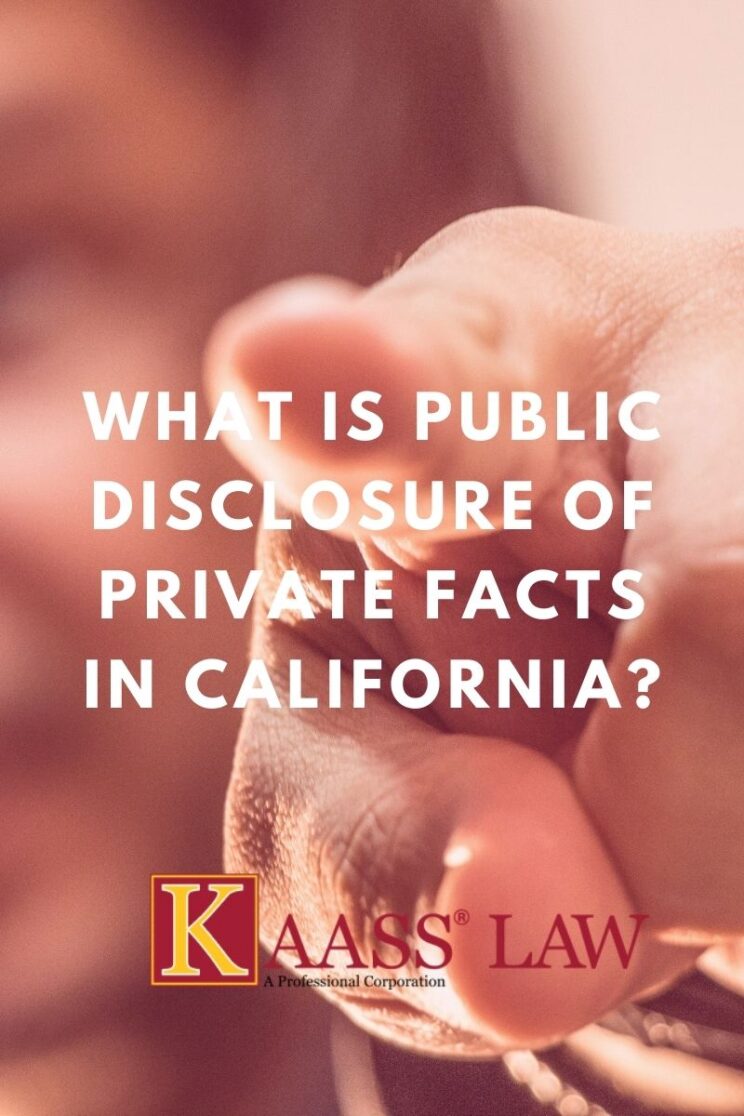The right to privacy has two key aspects:
- The general law of privacy, which affords a tort action for damages resulting from an illegal invasion of privacy
- The constitutional right of privacy, which protects personal privacy against illegal governmental invasion.
Invasion of privacy is tort-based allowing a victim to bring a lawsuit against a person who illegally intrudes into his private life, publicizes him in a false light, discloses his private information, or appropriates his name for personal gain.
In California, Public Disclosure of Private Facts is a Form of Invasion of Privacy.
Elements of Public Disclosure of Private Facts: CACI 1801
According to CACI 1801 to prove the claim of violation of a right of privacy the plaintiff must be able to establish the following elements:
- Defendant publicized private information concerning the plaintiff
- A reasonable person in the position of the plaintiff would consider the publicity highly offensive
- Defendant knew or acted with reckless disregard of the fact, that a reasonable person in the position of the plaintiff would consider the publicity highly offensive
- Private information wasn’t of legitimate public concern
- Plaintiff was harmed
- Defendant’s conduct was a substantial factor in causing harm to the plaintiff
To recover on a claim for invasion of privacy based on public disclosure of private facts, the plaintiff needs to show that the disclosed information was private and not of legitimate concern to the public, and that disclosure would be highly offensive to any reasonable person. The plaintiff must show that the disclosure of facts was actually public in nature. The defendant can’t be liable when he merely gives further publicity to information about a plaintiff that is already public.
Examples of Public Disclosure Include Publications In:
- Books
- Newspapers
- Magazines
- Motion pictures
- Radio or television broadcasts
Newsworthy Private Facts
A private fact can be considered newsworthy if some reasonable members of the community could entertain a legitimate interest in it. Generally, courts recognize that the public has a legitimate interest in almost all current events, even if it contains private information about participants, as well as a legitimate interest in the private lives of notorious or prominent figures, such as professional athletes, actors, actresses, public officers, noted inventors.
In deciding whether the information was a matter of legitimate public concern the following factors must be concerned:
- The social value of the information
- The extent of the intrusion into the plaintiff’s privacy
- Whether the plaintiff consented to the publicity explicitly or by voluntarily seeking public attention or a public office
Legal Defenses to a Public Disclosure of Private Facts Claim
- Plaintiff couldn’t manage to prove all the above-mentioned elements of the claim
- The disclosed facts were true gathered from public records
- The defendant had the prior consent of the victim to disclose the information
Damages a Victim Can Recover
The compensatory damages a victim can recover depend on the specific facts of a case. Here are some common examples of damages:
- Loss of reputation
- Damage to the trade or occupation
- Loss of business income as a result of the disclosure
Are you in need of additional information regarding a specific situation that you or a loved one are involved in? KAASS LAW attorneys you should be able to provide you with legal assistance regarding the matter.


Pingback:Invasion of Privacy in California - KAASS LAW